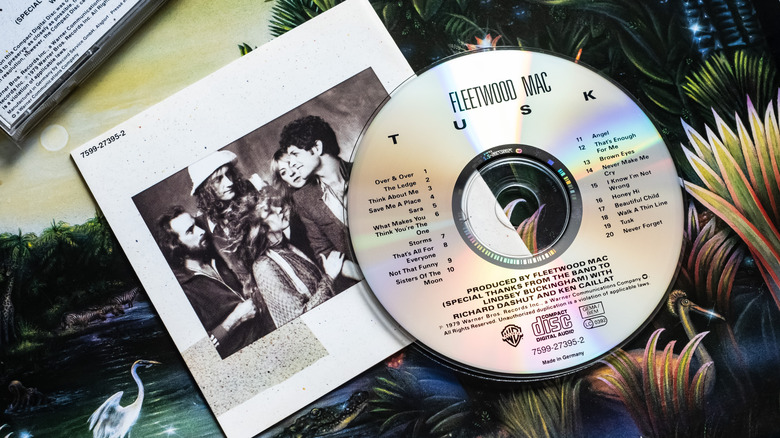Stevie Nicks Actually Loathed This 1979 Fleetwood Mac Album Title
Stories of tension among Fleetwood Mac members are the stuff of rock 'n' roll legends. Tempestuous love affairs and acrimonious break-ups helped fuel the creativity of one of rock's most successful acts. By the time the now-iconic lineup assembled to record their third album together, Stevie Nicks had already been crowned the music industry's gold dust woman. Her dramatic lyricism and tendency toward a gauzy fantasy aesthetic helped set the tone for the band's biggest era. But it turns out Nicks wasn't a fan of the name for the "Tusk" album at all.
Following up a mega-selling juggernaut like 1977's "Rumors" was a tall order, and tensions only grew while Lindsey Buckingham experimented with odd production techniques and sounds that strayed from the style that helped the band sell millions of albums. It was a strange and unexpected two-LP collection of songs that emerged, one that held moments of true genius paired with jangling creations where reach exceeded grasp. It only added to the emotionally-charged connections among the members, with Nicks' sensitivity making her particularly edgy.
So when it was time to give this musical beast a name, the one that was chosen did not sit well with Nicks' at all. Was she simply being obstinate after indulging Buckingham's musical whims? Or did she maybe have valid reasons for detesting the title of what turned out to be a sharp left turn in the Fleetwood Mac canon? Having a lousy album title might be Stevie Nicks' greatest regret, but the story behind the name seems to justify her distaste.
Stevie Nicks thought the title of the Tusk album was disrespectful for a few reasons
The "Tusk" album took more than a year to finish, a process that taxed the members of Fleetwood Mac almost as much as recording "Rumors" had. Stevie Nicks had contributed some of her finest compositions to the record; haunting tunes like "Sara," "Angel," and "Beautiful Child" would become fan favorites. And when she heard that the title being floated for the double album was "Tusk," she was not a happy camper.
What exactly was her objection to using such an abstract term for a rock and roll record? In an interview with Mojo, Nicks explained that she found the word to be inelegant and crude, though it may have been inspired by tusks that decorated the studio space where the band was working. Along these lines, Nicks saw the name as a vision of animal cruelty, conjuring images of elephants being slaughtered for their ivory.
But when she heard the possible reason it had actually been chosen, she went from mere disapproval to sheer disgust. Apparently, the word "tusk" was a reference to drummer Mick Fleetwood's private parts, a detail that Nicks was clued into after the album was finished. The raunchiness was bad enough; coupled with Nicks and Fleetwood having an affair at the start of recording, it became an unseemly reference. It's easy to see why Nicks would have been offended, if not outright horrified, after learning the crude and mysterious reason for the Fleetwood Mac album title being chosen.
Nicks may not love the title, but fans sure love the album — now, at least
Despite Stevie Nicks' resistance, the album was indeed named "Tusk" and was released amidst great anticipation. Unfortunately, the reception was tepid; the world was expecting "Rumors II" but instead, it received a hodgepodge of works that had the DNA of classic Fleetwood Mac music sharing vinyl with sonic strangeness that bore little resemblance to the band's previous smash hits.
Almost 50 years later, diehard Fleetwood Mac fans and music experts have come to appreciate the risks being taken with "Tusk." Instead of relying on formula, Lindsey Buckingham zigged when he could have zagged and pushed the other players into new territory. Whatever false facts you might believe about Fleetwood Mac and the "Tusk" ordeal, the songwriting and performances are solid, especially Nicks' timeless studies of love and loss, and the global strangeness that permeates the discs has become commonplace in a post-world music landscape.
Would the album have been more successful with a different name? Would Stevie Nicks have been surly about the album regardless of the title, considering the frayed emotions the band was going through at the height of their success? The fact that "Tusk" is still a seminal work for the long-lived band suggests that even the lewd inside joke couldn't change its fate, though it would go on to sell four million copies. But it is intriguing to wonder what the "Rhiannon" singer would have opted for as a title instead.


